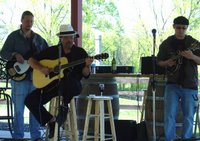Had he lived, my father would have turned 80 years old today. Since he died fourteen years ago, it’s hard to imagine what he would be like now. I’m not sure that age would have mellowed him much. He had a way about him that made him easy to dislike. When he drank, which was often, instead of turning happy and cheerful like the characters portrayed in beer commercials, he became more sullen and angry. Some of my worst memories of him are when he had had a few too many and lashed out at those around him.
While our past shouldn’t be an excuse for our present actions, dad’s formative years were particularly difficult. His own father wasn’t around much and he had to watch a younger brother die from what I understand was a ruptured appendix at nine years of age. He left the dust bowl of Oklahoma as a teenager but instead of going to California like the rest the family, he ended up in Arizona. It was from there that he joined the Navy at seventeen by lying about his age. He was stationed in the South Pacific during World War II where he saw heavy combat. On May 11, 1945, during the Battle of Okinawa, two Japanese suicide planes struck the
USS Bunker Hill, on which dad was stationed. The result was 346 men (about ten percent of the crew) killed and another 46 missing. Dad never talked about it.
Sometimes, I think the only thing I have in common with my dad is his name. I’m Ray Jr, but I’m not his oldest son. Dad hardly ever talked about his past and one of the secrets he kept was a previous marriage that produced two children. I don’t know much about my half-siblings, but I do know that my dad’s first son is an engineer (as I am) and is a runner (as I claim to be). Dad, though, was neither academically inclined nor given to much physical exercise.
Considering where he started, by the end of his life he had done pretty well for himself. When he was getting into trouble as a kid in Oklahoma, I don’t think he would have imagined living a relatively quiet suburban life on Long Island, with a devoted wife and four kids who turned out rather well. A twenty-year career in the Navy and the Air Force was followed by another twenty years at Grumman Aerospace as an aircraft inspector. I thought it was cool that he got to see F-14s up close. He never made a lot of money, but, except for a two-year layoff from Grumman, we never lacked for anything. When he died he had a credit card debt of about $500. That was it. No car payments. No house payments. I don’t know if I’ll ever be able to say that.
He retired from Grumman at sixty-two but he didn’t have long to enjoy retired life. Several months later, my mom was diagnosed with ovarian cancer. The next two years were spent dealing with the roller coaster of her illness, until she finally lost her battle in 1990. The following two years were probably the saddest of his life, as I imagine they would be for anyone who loses a spouse. His health declined and he began to drink even more. He started dating a woman, a relationship that I made sure he knew I disapproved of. To my shame, I judged him. I’ve always been somewhat of a moralist, finding fault in the way other people lived their lives while ignoring the plank in my own eye. The Christmas before he died was the first time I didn’t fly home to New York. I no longer felt comfortable around him and decided to stay in Texas. I didn’t call much, didn’t write. I seem to remember talking to him briefly a couple of weeks before my sister called me with the news. We probably didn’t say much to each other but I think we each managed to force out an “I love you.”
But there was no reconciliation. He died suddenly, no benefit of a lingering illness to say things that will forever remain unsaid or to get one’s affairs in order. I only hope that he found the peace that eluded him in this world. Today, he is buried in Calverton National Cemetery along with other members of the “Greatest Generation”, whose numbers are dwindling all too rapidly now. I know he would be proud to be among them.
He wasn’t the most tolerant of people, so I don’t know how he would react to the fact that I have a Chinese daughter, or that he had a Chinese granddaughter. I would like to think that she would melt that hard façade and win him over, like she does everyone else. But I’ll never know.
I leave you with the words to a song written by a man who did manage to reconcile a difficult relationship with his own father. I don’t have the gift with words that Bono has, so I’ll let this song speak for itself.
"Sometimes You Can't Make It On Your Own"Tough, you think you've got the stuff
You're telling me and anyone
You're hard enough
You don't have to put up a fight
You don't have to always be right
Let me take some of the punches
For you tonight
Listen to me now
I need to let you know
You don't have to go it alone
And it's you when I look in the mirror
And it's you when I don't pick up the phone
Sometimes you can't make it on your own
We fight all the time
You and I...that's alright
We're the same soul
I don't need...I don't need to hear you say
That if we weren't so alike
You'd like me a whole lot more
Listen to me now
I need to let you know
You don't have to go it alone
And it's you when I look in the mirror
And it's you when I don't pick up the phone
Sometimes you can't make it on your own
I know that we don't talk
I'm sick of it all
Can - you - hear - me - when - I –
Sing, you're the reason I sing
You're the reason why the opera is in me...
Where are we now?
I've still got to let you know
A house still doesn't make a home
Don't leave me here alone...
And it's you when I look in the mirror
And it's you that makes it hard to let go
Sometimes you can't make it on your own
Sometimes you can't make it
The best you can do is to fake itSometimes you can't make it on your own
 and just enjoy lunch and a couple of glasses of wine with the music. By far the best white wine Chrysalis makes is their Viognier, so my wife opted for that while I went for their Barrel Select Norton. Norton is a grape native to America and several Virginia wineries feature it. It's a full-bodied red that would stand up to any steak. As you can see from the picture, it's a dark ruby red color.
and just enjoy lunch and a couple of glasses of wine with the music. By far the best white wine Chrysalis makes is their Viognier, so my wife opted for that while I went for their Barrel Select Norton. Norton is a grape native to America and several Virginia wineries feature it. It's a full-bodied red that would stand up to any steak. As you can see from the picture, it's a dark ruby red color. Oh, and the music, courtesy of a trio called Gone Again, wasn't bad at all. Instead of the bland saccharine dreck I was expecting, their style tended more toward Van Morrison with a bit of bluegrass thrown in. All in all, a pretty good way to spend an afternoon.
Oh, and the music, courtesy of a trio called Gone Again, wasn't bad at all. Instead of the bland saccharine dreck I was expecting, their style tended more toward Van Morrison with a bit of bluegrass thrown in. All in all, a pretty good way to spend an afternoon.
 and just enjoy lunch and a couple of glasses of wine with the music. By far the best white wine Chrysalis makes is their Viognier, so my wife opted for that while I went for their Barrel Select Norton. Norton is a grape native to America and several Virginia wineries feature it. It's a full-bodied red that would stand up to any steak. As you can see from the picture, it's a dark ruby red color.
and just enjoy lunch and a couple of glasses of wine with the music. By far the best white wine Chrysalis makes is their Viognier, so my wife opted for that while I went for their Barrel Select Norton. Norton is a grape native to America and several Virginia wineries feature it. It's a full-bodied red that would stand up to any steak. As you can see from the picture, it's a dark ruby red color. Oh, and the music, courtesy of a trio called Gone Again, wasn't bad at all. Instead of the bland saccharine dreck I was expecting, their style tended more toward Van Morrison with a bit of bluegrass thrown in. All in all, a pretty good way to spend an afternoon.
Oh, and the music, courtesy of a trio called Gone Again, wasn't bad at all. Instead of the bland saccharine dreck I was expecting, their style tended more toward Van Morrison with a bit of bluegrass thrown in. All in all, a pretty good way to spend an afternoon.


